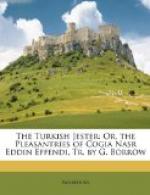Transcribed from the 1924 Norwich edition, Vol. 16, Miscellanies, by David Price, email ccx074@coventry.ac.uk
[Original cover page: cover.jpg]
The Turkish Jester;
or,
the Pleasantries
of
Cogia Nasr Eddin Efendi.
Translated from the Turkish
by
George Borrow.
Ipswich:
W. Webber, Dial Lane,
1884.
THE PLEASANTRIES OF COGIA NASR EDDIN EFENDI
’A breeze, which pleasant
stories bears,
Relicks of long departed years.’
The story goes, one of the stories of a hundred, that Cogia Nasr Eddin Efendi one day ascending into the pulpit to preach, said, ’O believers, do ye not know what I am going to say to you?’ The congregation answered, ‘Dear Cogia Efendi, we do not know.’ Then said the Cogia, ‘What shall I say to you until you do know?’ One day the Cogia ascending again into the pulpit, said, ’O Mussulmen, do ye not know what I am going to say to you?’ ‘We do know,’ they replied. Then said the Cogia, ’Some of ye do know already, what should I have to say to you?’ Then descending from the chair he went out. The assembly separated quite astonished, and, when they were out, continued to say, ’Which are those of us who know? Which are those who do not know?’ The Cogia one day again mounting the chair in the same manner, said, ’O brothers, when I said to ye, “Do you know what I shall say?” there were some who said, “We know,” others said, “We do not.” It were now well that those among ye who knew what the Cogia said should teach those that did not.’
One day Cogia Nasr Eddin Efendi said, ’O Mussulmen, give thanks to God Most High that He did not give the camel wings; for, had He given them, they would have perched upon your houses and chimneys, and have caused them to tumble upon your heads.’
One day Cogia Nasr Eddin Efendi having mounted the chair in a city, said, ’O Mussulmen, the air above this city is just like the air above my city.’ The congregation said, ‘O Cogia Efendi, how do you know that?’ Said the Cogia, ’Because I have seen as many stars above this city as I saw above Belgrade.’
One night the Cogia dreamt that he was given nine aspres, whereupon the Cogia said, ‘O now pray make them up ten’; afterwards he said, ’Make them up eleven,’ and then presently, a dispute having arisen, he awoke and saw that in his hand he had nothing, thereupon closing his eyes anew and stretching out his hands, he said, ’Well, well, I shall be content with nine aspres.’
One day the Cogia went out into the plain, and as he was going along he suddenly saw some men on horseback coming towards him. Cogia Efendi, in a great hurry, set off towards a cemetery, and having reached it took off his clothes, and entering into a tomb lay down. The horsemen, on seeing the Cogia run away, followed him to the place where he lay, and said, ’O fellow, why do you lie here?’ Cogia Efendi, finding nothing else to say, replied, ‘I am one of the buried people, but came here to walk.’




